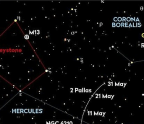BULLETIN

It’s raining space rocks
Two Asian nations succeed in sample return missions for the first time
Not one, but two samples of pristine space rock made their way back to Earth in December 2020 – one from an asteroid, another from the Moon. It’s the first time such a mission has been a success in almost 15 years.
The first to arrive back was Hayabusa 2, a Japanese spacecraft that returned from asteroid Ryugu on 5 December, after a year-long journey back to Earth. The spacecraft crashed landed in the Woomera Prohibited Area near Adelaide in Australia. The Japanese space agency, JAXA, quickly located the return capsule by its radio signal and transferred it to the Extraterrestrial Sample Curation Center in Japan. Here the team were able to open up the sample canister without risk of terrestrial contamination and could
You’re reading a preview, subscribe to read more.
Start your free 30 days





